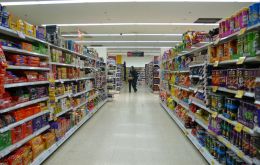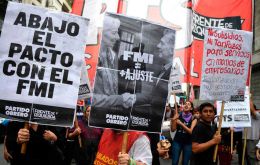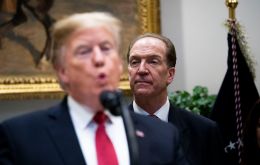MercoPress. South Atlantic News Agency
Tag: economy
-
Wednesday, April 17th 2019 - 09:58 UTC
Argentina's inflation 54.7% in 12-months; more monetary “contraction measures” and support from IMF

Argentina's inflation rate accelerated for the third straight month in March, the government statistics agency said on Tuesday, prompting the central bank to unveil fresh measures to temper raging inflation and protect the embattled peso currency.
-
Wednesday, April 17th 2019 - 09:39 UTC
EU approves rules to protect workers in the “gig economy”

The European Parliament has approved new EU rules to protect workers in the so-called “gig economy”(*). The law sets minimum rights and demands increased transparency for those in “on-demand” jobs, such as at Uber or Deliveroo.
-
Tuesday, April 16th 2019 - 08:59 UTC
Credit risk agencies lower Brazil's growth estimates for 2019

JPMorgan Chase & Co and Barclays became the latest financial institutions to lower their estimates for Brazil’s economic growth this year, on the back of weak activity data and increased political uncertainty.
-
Friday, April 12th 2019 - 09:28 UTC
IMF's Lagarde glad a chaotic Brexit was avoided but warns about a prolonged uncertainty impact

Further uncertainty over Brexit will hinder growth in the UK economy, the head of IMF has told the BBC. Speaking ahead of the agreement of an extension to Article 50, Christine Lagarde warned that businesses and investors will remain hesitant in the coming months. She said any prolonged uncertainty would have a “negative impact”.
-
Friday, April 12th 2019 - 09:11 UTC
Brazil inflation 0.75% in March and 4.58% in twelve months

Brazil's inflation rate hit 0.75% in March, the fourth straight month of increases and the highest for the month since 2015 when it registered 1.32%, Brazil's National Institute of Geography and Statistics (IBGE) said on Wednesday.
-
Thursday, April 11th 2019 - 09:31 UTC
The Trouble with Argentina’s Economy

With sustained economic growth, Argentina would be able to avoid another debt crisis. Although there are no silver bullets to put the economy on a more stable path, changing current macroeconomic policies would at least give the country a chance.
-
Wednesday, April 10th 2019 - 09:58 UTC
“My trade wars aren't finished yet”, Trump warns IMF and World Bank spring meetings

United States president Donald Trump is sending a clear message to the economic policymakers gathering in Washington for the IMF and World Bank's spring meetings: My trade wars aren't finished yet and a weakening global economy will just have to deal with it.
-
Wednesday, April 10th 2019 - 09:19 UTC
IMF cuts global 2019 growth; suggests rich countries should prop their economies

The International Monetary Fund on Tuesday cut its global economic growth forecasts for 2019 and warned growth could slow further due to trade tensions and a potentially disorderly British exit from the European Union.
-
Friday, April 5th 2019 - 17:45 UTC
US Treasury official David Malpass elected as World Bank’s president

David Malpass has been chosen as the president of the World Bank Group (WBG) on Friday after being unanimously elected by the executive board of the organization with no other candidates.
-
Thursday, April 4th 2019 - 09:34 UTC
Combative exchanges as Brazilian congress debates the pensions' system reform

Brazilian Economy Minister Paulo Guedes on Wednesday put up a vigorous defense of the government’s proposed pension reform, insisting it is critical to fixing the country’s “doomed” social security system but opening the door to some concessions.
